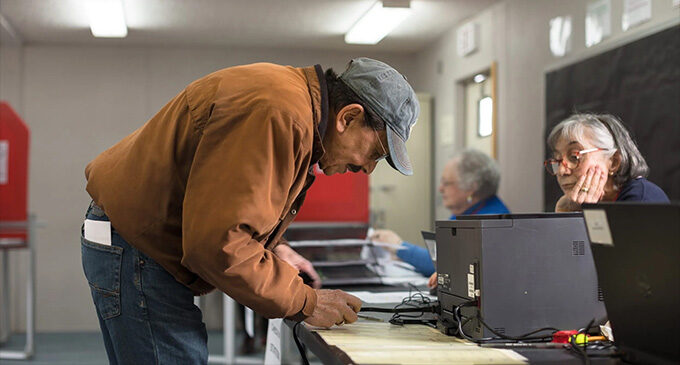The vote must go on. Planning elections in a disaster area.

By Lucas Thomae
The North Carolina State Board of Elections released the beginnings of a plan Monday to address voting access in the western part of the state following devastation wrought by Tropical Storm Helene.
“As rescue and recovery efforts continue after (Tropical Storm) Helene, North Carolina election officials are working to ensure voters affected by the storm can still cast their ballot in the 2024 general election,” the State Board said in a press release Monday evening.
North Carolina mailed out the last of its absentee ballots on Sept. 24. In-person early voting begins Oct. 17 and ends Nov. 2. Election Day is Nov. 5.
The State Board exercised its emergency powers Monday to allow 25 counties in badly affected areas to reschedule their mandatory pre-Election Day absentee ballot meetings. The unanimous decision came Monday afternoon at a special meeting the State Board convened virtually.
The 25 counties to which the resolution applies – Alexander, Alleghany, Ashe, Avery, Buncombe, Burke, Caldwell, Catawba, Clay, Cleveland, Gaston, Haywood, Henderson, Jackson, Lincoln, Macon, Madison, McDowell, Mitchell, Polk, Rutherford, Transylvania, Watauga, Wilkes and Yancey – are the same that comprise the federally declared disaster area.
These weekly public meetings – which were scheduled to start Tuesday, Oct. 1 – are an important part of the electoral process in which county boards review and act upon issues related to absentee ballots before Election Day.
According to State Board Chair Alan Hirsch, the meetings are mostly used to review each application for an absentee ballot, which is mailed back with the ballot itself, to determine whether that ballot should be counted.
“Any rescheduled meetings should take place as soon as practicable,” the resolution read. “These county boards may also schedule additional absentee ballot meetings, if required as a result of the disaster.”
County boards of election will need to provide at least 48 hours notice prior to any rescheduled or additional meetings.
The potential change in scheduling is not expected to affect compliance with any other state or federal deadlines. State Board members Kevin Lewis and Four Eggers, the only two Republicans on the five-person board, expressed support for the resolution and added that the first of these absentee ballot meetings are typically “light duty” and wouldn’t impact the rest of the lead-up to Election Day.
Of the 22 county governments that the State Board has been in touch with, 14 were closed Monday and many expect their offices to be closed for several more days, State Board Executive Director Karen Brinson Bell said during Monday’s meeting. The county board of elections offices are “in good shape” structurally, she said, but many county governments are still reeling from internet and phone connectivity issues due to the storm.
As a result, local government operations in affected areas will be compromised for an indeterminate amount of time. According to the press release, the State Board is not aware of any voting equipment or printed ballots being lost or damaged as a result of the storm. Assessments to confirm that are ongoing.
“Details on changes to early voting sites or Election Day polling places will be released as soon as information is available,” the State Board’s statement said.
“When voting sites are not available, options include moving or combining polling locations.”
The State Board will provide special emergency kits to counties without internet service. These “election offices in a box,” contain resources that will allow county elections workers to continue registering voters and processing absentee ballot requests.
Additionally, mail delivery and other operations of the U.S. Postal Service are suspended at dozens of post offices in the western part of the state, which may further hinder absentee voting.
The State Board said in its press release that it will consider ways “to make voting available in areas affected by Helene” and reminded voters who’ve requested an absentee ballot that they do not have to use that ballot. They can discard that ballot and instead vote in-person if they’d prefer.
Voters who have been displaced by the storm and are living at a temporary address can also request an absentee ballot sent to that address. The easiest way to request an absentee ballot is online through the absentee ballot portal.
Any voters who have already requested an absentee ballot but can no longer receive it at their original address should contact their county boards of elections to spoil the original ballot and have a new one sent to their temporary address.
Under state law, a voter who cannot provide a photo ID when they vote may fill out a Photo ID Exception Form to explain why. One of the permitted exceptions is for voters who can’t provide ID because of a natural disaster that occurred within 100 days of an election and that resulted in a disaster declaration by the president of the United States or the governor of North Carolina.
This means that voters in the 25 counties under the federal disaster declaration are permitted to use this exception if necessary.
The State Board launched a webpage as a source of information for voters affected by the Helene. It includes information on county board office closures, tips for voters affected by the storm, and basic information about voting in this election. It will be updated routinely.
Election officials also will work to provide printed materials to voters in the affected areas who may not have cell phone service or internet access.









